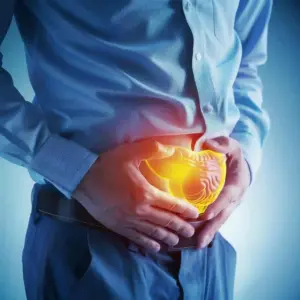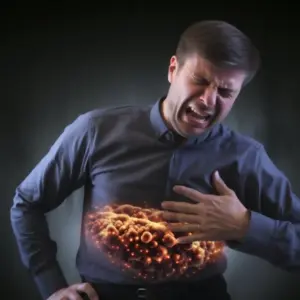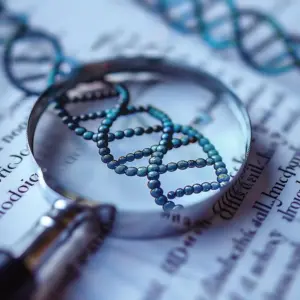Understanding and Managing Common Esophageal Disorders
Learn about esophageal disorders, their symptoms, causes, diagnosis, and treatments for better digestive health.

Esophageal Disorders
The esophagus is a muscular tube that carries food and liquids from your mouth to your stomach. When this passage gets inflamed, narrowed, or obstructed, it can cause discomfort and affect your ability to eat or swallow. Esophageal disorders include conditions such as gastroesophageal reflux disease (GERD), esophagitis, Barrett’s esophagus, achalasia, and esophageal cancer.
At VS Hospitals, advanced gastroenterology experts provide comprehensive evaluation and treatment for all types of esophageal conditions. The hospital combines cutting-edge diagnostic tools with personalized care to ensure the best possible outcomes for patients.

Early Detection Saves Lives
Early detection and treatment are crucial for improving the chances of survival. If you notice any concerning symptoms, consult a healthcare provider immediately.
Signs and Symptoms
Difficulty swallowing (dysphagia)
A feeling that food is stuck in your throat or chest.
Heartburn and acid reflux
Burning sensation in the chest, especially after meals or while lying down.
Chest pain
Sharp or squeezing pain that can sometimes mimic heart-related discomfort.
Chronic cough or sore throat
Caused by acid reflux or inflammation of the esophageal lining.
Hoarseness or voice changes
Resulting from repeated acid irritation.
Regurgitation
Food or sour liquid flowing back into your mouth.
Unintentional weight loss
A red flag that may indicate a serious underlying issue like cancer or severe narrowing.
Blood in Urine
Hematuria - pink, red, or dark urine, the most common symptom
Frequent Urination
Feeling the need to urinate frequently, even when bladder is not full
Painful Urination
Experiencing pain or burning sensation while urinating
Back or Pelvic Pain
Pain that occurs as the cancer grows and spreads
Unexplained Weight Loss
Significant weight loss not related to diet or exercise
Fatigue
Feeling unusually tired or weak without a clear cause
Patients should seek immediate medical attention if they experience persistent pain, difficulty swallowing, or vomiting blood, as these could indicate advanced esophageal disease requiring urgent treatment.
Meet Our Expert Esophageal Disorders Specialists
Risk Factors
Smoking
Smoking is one of the leading causes of bladder cancer. Chemicals in tobacco smoke can damage the lining of the bladder, increasing the risk.

Gender
Men are at a higher risk of developing bladder cancer than women.

Chronic Bladder Infections or Inflammation
Conditions such as bladder infections and long-term bladder inflammation can increase the risk.

Exposure to Chemicals
Prolonged exposure to certain chemicals, especially those used in the dye industry, rubber production, and chemical manufacturing, increases the risk.

Unhealthy diet
Consuming spicy, fatty, or processed foods increases acid reflux and inflammation.

Smoking and alcohol
Both irritate the esophageal lining and raise the risk of esophageal cancer.

Obesity
Excess abdominal fat pushes acid upward into the esophagus, leading to chronic reflux.

Hiatal hernia
This structural issue allows stomach acid to move more easily into the esophagus.

Chronic acid reflux
Long-term exposure to stomach acid can cause damage and lead to Barrett’s esophagus.

Certain medications
Some drugs like NSAIDs, steroids, or antibiotics may irritate the esophagus.

Genetic predisposition
Family history of esophageal disorders or cancer can increase susceptibility.

Esophageal Disorders
Diet and Nutrition
Prevention
Diagnosis
Key Services
Key Facilities
Nutrition plays a critical role in managing and preventing esophageal problems. The gastro-dietitians at VS Hospitals create tailored meal plans to soothe symptoms and promote healing.
- Eat Smaller, Frequent Meals: Large meals increase pressure on the esophagus and cause reflux.
- Avoid Trigger Foods: Spicy, oily, citrus-based, tomato, chocolate, and caffeine-heavy foods can irritate the esophagus.
- Include Alkaline Foods: Bananas, oatmeal, green vegetables, and yogurt help neutralize acid.
- Stay Hydrated: Drinking enough water helps digestion and reduces acid concentration.
- Avoid Lying Down After Meals: Wait at least 2–3 hours before lying or sleeping.
- Limit Alcohol and Smoking: Both relax the lower esophageal sphincter and increase acid flow.
- Opt for Soft Textures: Smooth soups, mashed vegetables, and porridge ease swallowing for patients with dysphagia.
- Moderate Fiber Intake: Helps bowel regularity but should be adjusted based on tolerance.
- Healthy Weight Management: Balanced diets help control obesity-related reflux.
VS Hospitals’ diet and nutrition experts ensure each patient receives scientifically backed and individualized diet support for long-term esophageal wellness.
Preventing esophageal disorders requires lifestyle adjustments and awareness of risk behaviors. The gastroenterology team at VS Hospitals recommends the following preventive measures:
- Maintain a Healthy Weight: Reduces abdominal pressure that causes reflux.
- Avoid Overeating: Helps prevent regurgitation and acid exposure.
- Sleep Position Matters: Elevate the head during sleep to stop acid backflow.
- Quit Smoking and Alcohol: Protects the esophageal lining from irritation.
- Eat Mindfully: Chew thoroughly and avoid rushing meals.
- Monitor Medications: Use antacids or acid reducers under medical guidance, not long-term self-medication.
- Stay Physically Active: Light daily exercise improves digestion and muscle tone.
- Manage Stress: Yoga, meditation, or relaxation techniques help control acid secretion.
- Routine Screening: Regular endoscopy helps detect early signs of esophagitis or Barrett’s esophagus.
At VS Hospitals, prevention is treated as a key element of healthcare — helping patients live comfortably without recurring digestive discomfort.
Accurate diagnosis is the foundation for effective treatment. VS Hospitals uses modern gastroenterology technology to detect esophageal disorders at their earliest stages. Diagnostic methods include:
- Endoscopy (Upper GI Endoscopy): A flexible tube with a camera is inserted to visualize inflammation, ulcers, or tumors.
- Barium swallow X-ray: Patients drink a contrast liquid to highlight the esophagus in X-rays, revealing narrowing or blockages.
- Esophageal manometry: Measures the pressure and muscle contractions during swallowing to detect motility disorders.
- pH monitoring: Tracks acid levels in the esophagus over 24 hours to confirm reflux.
- Biopsy: Tissue samples are taken during endoscopy to check for infection, inflammation, or cancerous changes.
- CT or MRI scans: Used when structural abnormalities or cancer are suspected.
These investigations help specialists at VS Hospitals design a precise treatment plan—whether it’s medication, lifestyle modification, or surgery.
VS Hospitals offers a full range of diagnostic, medical, and surgical solutions for esophageal disorders. The team of experienced gastroenterologists, surgeons, and dieticians ensures comprehensive management tailored to individual needs.
- Comprehensive GERD Management: Advanced medications like PPIs and lifestyle modifications are combined with endoscopic or laparoscopic anti-reflux procedures for chronic acid reflux.
- Esophageal Stricture Treatment: Endoscopic dilation techniques safely widen narrowed esophageal sections to restore normal swallowing.
- Motility Disorder Care: Botox injections or surgical myotomy effectively manage achalasia and other motility issues.
- Barrett’s Esophagus Management: Regular surveillance endoscopy ensures early detection of precancerous changes in the esophagus.
- Precancerous Lesion Removal: Endoscopic mucosal resection (EMR) and radiofrequency ablation (RFA) eliminate abnormal or dysplastic tissues.
- Esophageal Cancer Treatment: A multidisciplinary approach combining surgery, chemotherapy, and radiation ensures personalized and effective cancer care.
- Nutritional & Lifestyle Counseling: Expert dieticians guide patients on reflux-friendly diets, weight management, and healthy lifestyle habits for long-term relief.
By combining modern medical technology with evidence-based clinical practices, VS Hospitals provides superior outcomes and faster recovery for patients with esophageal conditions.
VS Hospitals stands out as one of the best centers for esophageal treatment due to its world-class infrastructure and technology-driven approach. The key facilities include:
- State-of-the-art Endoscopy Suite: Equipped with high-definition video endoscopes for accurate and minimally invasive diagnostics.
- Laparoscopic and Robotic Surgery Unit: Allows precision surgery with minimal scarring and faster recovery time.
- 24/7 Emergency Care: Immediate response for severe cases like food impaction or bleeding.
- Oncology Department: Specialized cancer care for patients with esophageal malignancies, including targeted therapy and radiation oncology.
- ICU and Post-Operative Care Units: Advanced monitoring systems ensure patient safety and comfort during recovery.
- In-house Laboratory and Imaging: Quick access to diagnostic reports for faster treatment decisions.
- Dietary and Nutrition Counseling: Helps patients manage symptoms through personalized meal plans.
- Rehabilitation and Support Services: Physical and emotional support for long-term disease management.
Each department at VS Hospitals works in coordination to provide seamless and compassionate care, ensuring patients receive complete recovery and improved quality of life.
Top Medical Facilities at Our Multispeciality Hospital – Here’s What Makes Us Different!
Ready to Begin Your Esophageal Treatment Journey?
Learn More About Esophageal Disorders
Frequently Asked Questions
Most esophageal disorders arise from chronic acid reflux, poor diet, smoking, alcohol, or infections. Certain medications, obesity, and stress can worsen the condition. At VS Hospitals, doctors identify and manage these root causes through dietary changes, lifestyle correction, and targeted medical treatments for long-term recovery and symptom control.
Treatment depends on the type and severity of the disorder. VS Hospitals provides comprehensive care that includes medications to control acid, endoscopic dilation for strictures, minimally invasive surgeries for motility disorders, and advanced cancer therapies. Each plan is customized after thorough diagnosis and multidisciplinary consultation to ensure the best results.
If you experience persistent heartburn, difficulty swallowing, chest pain, or unexplained weight loss, consult a gastroenterologist immediately. VS Hospitals offers early detection and intervention services using advanced diagnostics. Timely evaluation prevents serious complications like Barrett’s esophagus or cancer and ensures faster, safer recovery through expert care.
